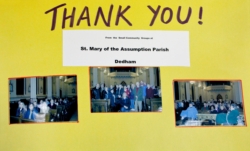From Cardinal Seán’s blog
The Vatican announced (last) week that the Holy Father has lifted the excommunications of four bishops of the Society of St. Pius X. I was pleased with the news which shows, once again, the Holy Father’s concern for unity and reconciliation in the Church.
In 1988 Archbishop Marcel Lefebvre, who was critical of some elements of the Second Vatican Council, ordained four bishops without the approval of the Holy Father, incurring in automatic excommunication on himself and the four bishops he ordained.
This action follows the publication of the Apostolic Letter Summorum Pontificum a year and a half ago, in which the Holy Father lifted previous restrictions on the celebration of the Mass according to the 1962 Missal, commonly known as the Tridentine Mass.
Just before the publication of the Apostolic Letter, I was privileged to be a part of a meeting of cardinals and bishops with the Holy Father in which he expressed his hope that his action would help convince those disaffected Catholics to return to full union with the Catholic Church.
So, his outreach to the communities who follow these bishops is just one more manifestation of his ardent desire to bring these people (which some estimate to be as many as 1.5 million) back into the fold. We know that these are generally people who practice their faith and try to live a Christian life seriously but, unfortunately, I believe that they have been misled by their leadership.
Of course, lifting the excommunications was a first step; it does not regularize these bishops or the Society of St. Pius X, but it opens the way for a dialogue. This step was in response to a letter in which they professed their desire for full participation in the life of the Church.
It was tragic that one of the four bishops, Bishop Richard Williamson, had made outrageous statements about the Holocaust and about the September 11 attacks on the United States. It certainly raises questions as to the caliber of the leadership that the Society has. Additionally, as terrible as the comments were, it underscores the importance for the Holy Father to have increasing influence over those communities.
We are very sorry that the people in the Jewish community have been so pained and outraged by Bishop Williamson’s statements. I think the Holy Father’s statements and those of Cardinal Walter Kasper, chairman of the Pontifical Commission for Religious Relations with the Jews, have been very clear to dissociate the Catholic Church from those kinds of sentiments. I was pleased that the head of the Society of St. Pius X, Bishop Bernard Fellay, also repudiated the statements of Bishop Williamson.
It is very important for us to always remember the Holocaust so that such an atrocity could never take place again. I recall the words of the Holy Father this week: “May the Shoah be for everyone an admonition against oblivion, negation and reductionism, because violence against a single human being is violence against all.”
Mexico City policy
Also (last) week, as we feared, the President has chosen to reverse the Mexico City policy which prohibited U.S. government money from being used in programs which provide or promote abortions overseas. We can only speculate on what the implications of that decision are going to be.
When we see the numbers of abortions being performed in the developing world -- many of which are directed at girls in the womb -- it is very disturbing to think that our country is going to be promoting this kind of assault on human life and dignity throughout the world.
Abortion is a great evil and anytime restrictions to abortion are lifted it is a tragedy. As I said previously, it is very encouraging to see so many young people participating in the March for Life and in other events throughout the year. We must continue to educate new generations about the gift of life.



















